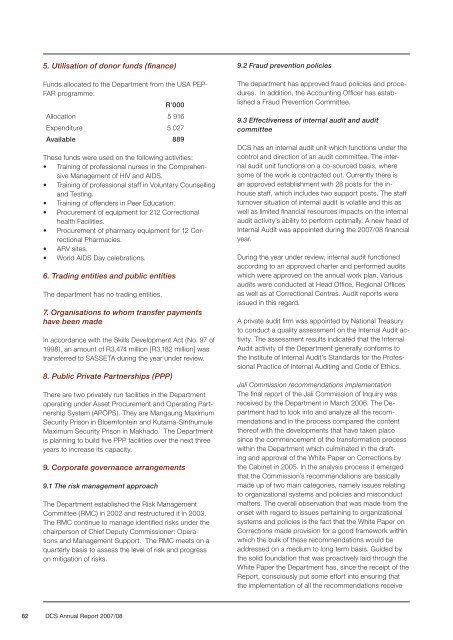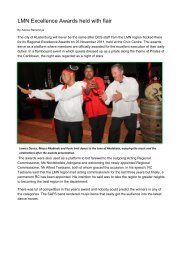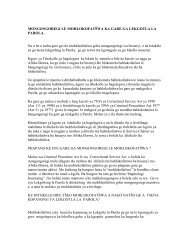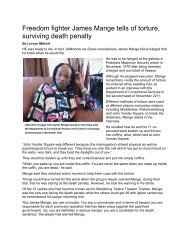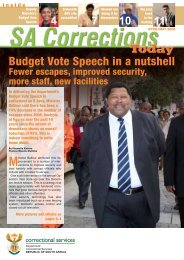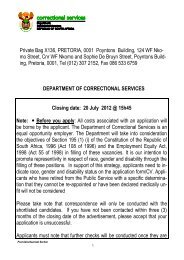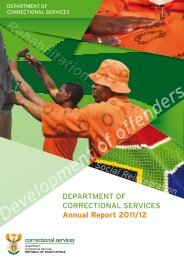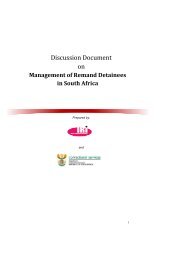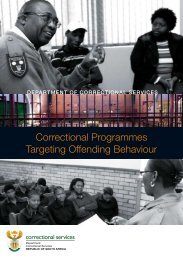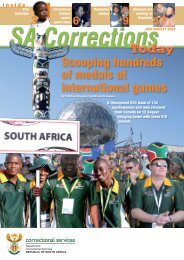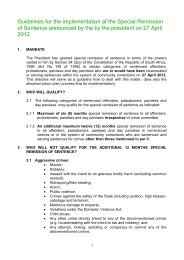As part of our commitment to rehabilitation of offenders, the ...
As part of our commitment to rehabilitation of offenders, the ...
As part of our commitment to rehabilitation of offenders, the ...
You also want an ePaper? Increase the reach of your titles
YUMPU automatically turns print PDFs into web optimized ePapers that Google loves.
5. Utilisation <strong>of</strong> donor funds (finance)<br />
Funds allocated <strong>to</strong> <strong>the</strong> De<strong>part</strong>ment from <strong>the</strong> USA PEP-<br />
FAR programme:<br />
82 DCS Annual Report 2007/08<br />
R’000<br />
Allocation 5 916<br />
Expenditure 5 027<br />
Available 889<br />
These funds were used on <strong>the</strong> following activities:<br />
• Training <strong>of</strong> pr<strong>of</strong>essional nurses in <strong>the</strong> Comprehensive<br />
Management <strong>of</strong> HIV and AIDS.<br />
• Training <strong>of</strong> pr<strong>of</strong>essional staff in Voluntary Counselling<br />
and Testing.<br />
• Training <strong>of</strong> <strong>of</strong>fenders in Peer Education.<br />
• Procurement <strong>of</strong> equipment for 212 Correctional<br />
health Facilities.<br />
• Procurement <strong>of</strong> pharmacy equipment for 12 Correctional<br />
Pharmacies.<br />
• ARV sites.<br />
• World AIDS Day celebrations.<br />
6. Trading entities and public entities<br />
The de<strong>part</strong>ment has no trading entities.<br />
7. Organisations <strong>to</strong> whom transfer payments<br />
have been made<br />
In accordance with <strong>the</strong> Skills Development Act (No. 97 <strong>of</strong><br />
1998), an amount <strong>of</strong> R3,474 million [R3,182 million] was<br />
transferred <strong>to</strong> SASSETA during <strong>the</strong> year under review.<br />
8. Public Private Partnerships (PPP)<br />
There are two privately run facilities in <strong>the</strong> De<strong>part</strong>ment<br />
operating under <strong>As</strong>set Procurement and Operating Partnership<br />
System (APOPS). They are Mangaung Maximum<br />
Security Prison in Bloemfontein and Kutama-Sinthumule<br />
Maximum Security Prison in Makhado. The De<strong>part</strong>ment<br />
is planning <strong>to</strong> build five PPP facilities over <strong>the</strong> next three<br />
years <strong>to</strong> increase its capacity.<br />
9. Corporate governance arrangements<br />
9.1 The risk management approach<br />
The De<strong>part</strong>ment established <strong>the</strong> Risk Management<br />
Committee (RMC) in 2002 and restructured it in 2003.<br />
The RMC continue <strong>to</strong> manage identified risks under <strong>the</strong><br />
chairperson <strong>of</strong> Chief Deputy Commissioner: Operations<br />
and Management Support. The RMC meets on a<br />
quarterly basis <strong>to</strong> assess <strong>the</strong> level <strong>of</strong> risk and progress<br />
on mitigation <strong>of</strong> risks.<br />
9.2 Fraud prevention policies<br />
The de<strong>part</strong>ment has approved fraud policies and procedures.<br />
In addition, <strong>the</strong> Accounting Officer has established<br />
a Fraud Prevention Committee.<br />
9.3 Effectiveness <strong>of</strong> internal audit and audit<br />
committee<br />
DCS has an internal audit unit which functions under <strong>the</strong><br />
control and direction <strong>of</strong> an audit committee. The internal<br />
audit unit functions on a co-s<strong>our</strong>ced basis, where<br />
some <strong>of</strong> <strong>the</strong> work is contracted out. Currently <strong>the</strong>re is<br />
an approved establishment with 28 posts for <strong>the</strong> inhouse<br />
staff, which includes two support posts. The staff<br />
turnover situation <strong>of</strong> internal audit is volatile and this as<br />
well as limited financial res<strong>our</strong>ces impacts on <strong>the</strong> internal<br />
audit activity’s ability <strong>to</strong> perform optimally. A new head <strong>of</strong><br />
Internal Audit was appointed during <strong>the</strong> 2007/08 financial<br />
year.<br />
During <strong>the</strong> year under review, internal audit functioned<br />
according <strong>to</strong> an approved charter and performed audits<br />
which were approved on <strong>the</strong> annual work plan. Various<br />
audits were conducted at Head Office, Regional Offices<br />
as well as at Correctional Centres. Audit reports were<br />
issued in this regard.<br />
A private audit firm was appointed by National Treasury<br />
<strong>to</strong> conduct a quality assessment on <strong>the</strong> Internal Audit activity.<br />
The assessment results indicated that <strong>the</strong> Internal<br />
Audit activity <strong>of</strong> <strong>the</strong> De<strong>part</strong>ment generally conforms <strong>to</strong><br />
<strong>the</strong> Institute <strong>of</strong> Internal Audit’s Standards for <strong>the</strong> Pr<strong>of</strong>essional<br />
Practice <strong>of</strong> Internal Auditing and Code <strong>of</strong> Ethics.<br />
Jali Commission recommendations implementation<br />
The final report <strong>of</strong> <strong>the</strong> Jali Commission <strong>of</strong> Inquiry was<br />
received by <strong>the</strong> De<strong>part</strong>ment in March 2006. The De<strong>part</strong>ment<br />
had <strong>to</strong> look in<strong>to</strong> and analyze all <strong>the</strong> recommendations<br />
and in <strong>the</strong> process compared <strong>the</strong> content<br />
<strong>the</strong>re<strong>of</strong> with <strong>the</strong> developments that have taken place<br />
since <strong>the</strong> commencement <strong>of</strong> <strong>the</strong> transformation process<br />
within <strong>the</strong> De<strong>part</strong>ment which culminated in <strong>the</strong> drafting<br />
and approval <strong>of</strong> <strong>the</strong> White Paper on Corrections by<br />
<strong>the</strong> Cabinet in 2005. In <strong>the</strong> analysis process it emerged<br />
that <strong>the</strong> Commission’s recommendations are basically<br />
made up <strong>of</strong> two main categories, namely issues relating<br />
<strong>to</strong> organizational systems and policies and misconduct<br />
matters. The overall observation that was made from <strong>the</strong><br />
onset with regard <strong>to</strong> issues pertaining <strong>to</strong> organizational<br />
systems and policies is <strong>the</strong> fact that <strong>the</strong> White Paper on<br />
Corrections made provision for a good framework within<br />
which <strong>the</strong> bulk <strong>of</strong> <strong>the</strong>se recommendations would be<br />
addressed on a medium <strong>to</strong> long term basis. Guided by<br />
<strong>the</strong> solid foundation that was proactively laid through <strong>the</strong><br />
White Paper <strong>the</strong> De<strong>part</strong>ment has, since <strong>the</strong> receipt <strong>of</strong> <strong>the</strong><br />
Report, consciously put some effort in<strong>to</strong> ensuring that<br />
<strong>the</strong> implementation <strong>of</strong> all <strong>the</strong> recommendations receive


